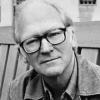Donald Davidson

Donald Davidson
Donald Herbert Davidsonwas an American philosopher. He served as Slusser Professor of Philosophy at the University of California, Berkeley from 1981 to 2003 after having also held teaching appointments at Stanford University, Rockefeller University, Princeton University, and the University of Chicago. Davidson was known for his charismatic personality and the depth and difficulty of his thought. His work exerted considerable influence in many areas of philosophy from the 1960s onward, particularly in philosophy of mind, philosophy of language, and action...
ProfessionPhilosopher
Date of Birth6 March 1917
If we cannot find a way to interpret the utterances and other behaviour of a creature as revealing a set of beliefs largely consistent and true by our own standards, we have no reason to count that creature as rational, as having beliefs, or as saying anything.
There are three basic problems: how a mind can know the world of nature, how it is possible for one mind to know another, and how it is possible to know the contents of our own minds without resort to observation or evidence. It is a mistake, I shall urge, to suppose that these questions can be collapsed into two, or taken into isolation.
Terminological infelicities have a way of breeding conceptual confusion.
The dominant metaphor of conceptual relativism, that of differing points of view, seems to betray an underlying paradox. Differentpoints of view make sense, but only if there is a common co-ordinate system on which to plot them; yet the existence of a common system belies the claim of dramatic incomparability.
Conceptual relativism is a heady and exotic doctrine, or would be if we could make good sense of it. The trouble is, as so often in philosophy, it is hard to improve intelligibility while retaining the excitement.
Even if someone knew the entire physical history of the world, and every mental event were identical with a physical, it would notfollow that he could predict or explain a single mental event (so described, of course).
Mental events such as perceivings, rememberings, decisions, and actions resist capture in the net of physical theory.
Nothing in the world, no object or event, would be true or false if there were not thinking creatures.
There is no such thing as a language, not if a language is anything like what many philosophers and linguists have supposed. Thereis therefore no such thing to be learned, mastered, or born with. We must give up the idea of a clearly defined shared structure which language-users acquire and then apply to cases.
Chris said Tony turned to him and said, 'What year were you born?' And he said '1923', so Tony said, 'You know what, I've got a 1923 model T Ford somewhere and I'll give it to you, if I can find it.
The Southerner does not have to labor to learn some things. We already know from the start who we are, where we are, where we belong, what we live by, what we live for.
But what Stewart is doing is still extraordinary.